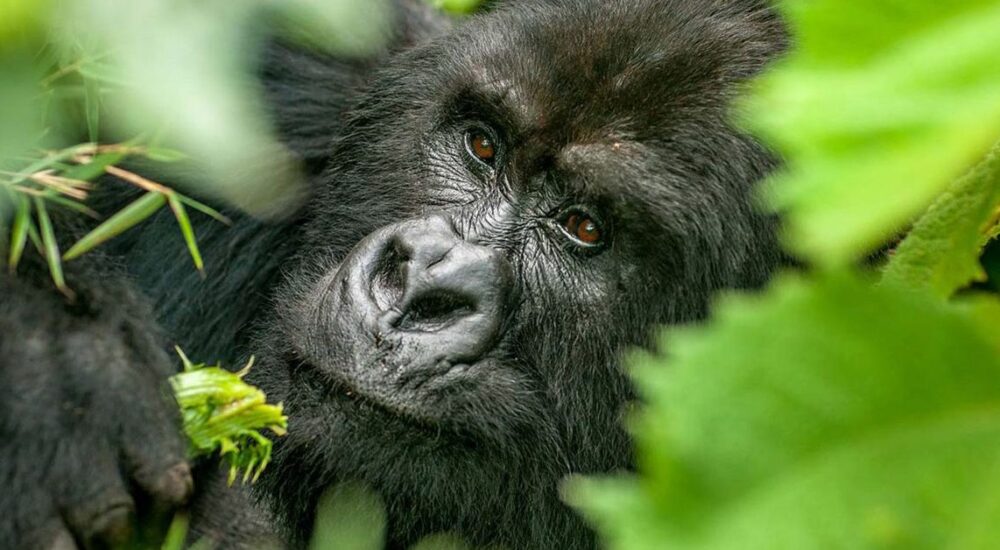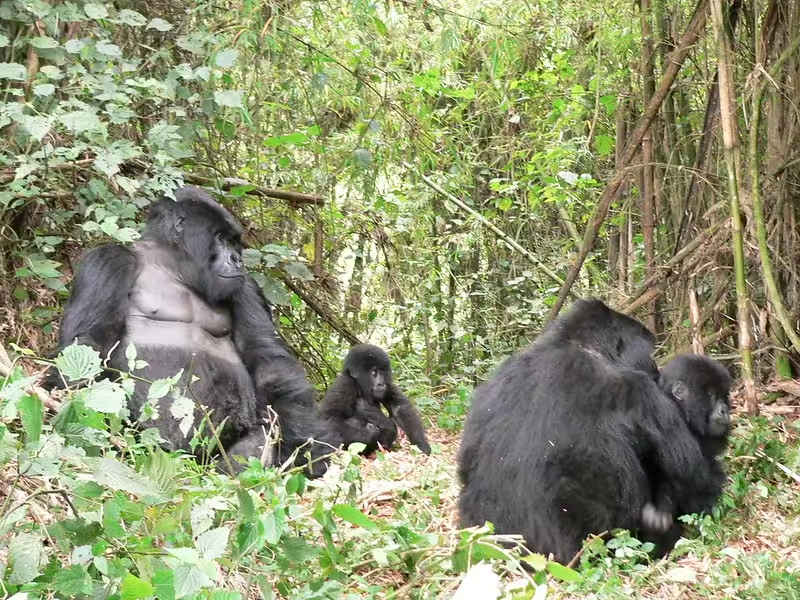If you're seeking an unparalleled wildlife adventure, the Gorilla Habituation Experience in Kahuzi-Biega National Park,…
How Intelligent Are Gorillas?
How Intelligent Are Gorillas?
Gorillas, particularly mountain gorillas and lowland gorillas, are among the most intelligent animals on the planet, exhibiting behaviors and skills that reflect their high cognitive abilities. Their intelligence is comparable in many ways to humans, as they share about 98% of the same DNA with us.
This similarity has led scientists to study gorillas extensively, particularly to understand their behavior, social structures, and problem-solving capabilities.
Complex Social Structures
One of the most notable signs of gorilla intelligence is their social structure. Gorillas live in groups called troops, which are typically led by a dominant male, known as the silverback. These groups are often composed of several females, their offspring, and sometimes younger males.
The silverback’s role is not only to protect the troop but also to make decisions for the group’s well-being. This hierarchical structure requires the ability to make decisions, communicate effectively, and respond to challenges from other gorillas or external threats, showing a high level of social intelligence.
Within the troop, gorillas form strong family bonds and engage in cooperative behaviors, such as grooming each other, which helps to maintain group cohesion and emotional well-being. These social interactions highlight their ability to develop complex relationships and emotional intelligence, which are essential for survival in the wild.
Problem-Solving and Tool Use
Gorillas are known to exhibit impressive problem-solving skills. Studies have shown that gorillas can manipulate objects in their environment and use them as tools. For example, they may use sticks to test water depth, fish for termites, or even crack open nuts. While not as advanced as some other primates like chimpanzees, gorillas still demonstrate a level of ingenuity when it comes to acquiring food and solving problems.
Additionally, gorillas have been observed using tools in a playful manner and in interactions with their environment. This ability to use tools reflects their cognitive flexibility, which is an important indicator of intelligence.
![]()
Communication Skills
Gorillas communicate using a combination of vocalizations, facial expressions, body language, and gestures. They are capable of conveying a range of emotions, such as anger, fear, affection, and excitement. For example, a gorilla may beat its chest to demonstrate dominance, or they may smile or show a relaxed posture when feeling comfortable and safe.
In addition to these natural forms of communication, there have been efforts to teach gorillas human-like sign language. The most famous example is Koko, a female gorilla who learned over 1,000 signs in American Sign Language. Koko’s ability to communicate with humans through sign language not only demonstrated her intelligence but also her emotional depth, as she expressed desires, emotions, and even a sense of humor through her signs.
Memory and Learning Abilities
Gorillas have a remarkable memory and are capable of learning complex tasks. In captivity, gorillas have been trained to recognize shapes, colors, and even operate basic machines. They can remember tasks and sequences of actions, and they are known to anticipate future events based on their past experiences. This ability to learn through experience and apply that knowledge is a testament to their long-term memory and cognitive adaptability.
Gorillas also exhibit cultural learning, meaning they can pass down behaviors and knowledge from one generation to another. For example, young gorillas often observe their mothers and other adult members of the group, learning how to find food, build nests, and interact socially. This transfer of knowledge through observation suggests that gorillas have the ability to learn from others, a key component of intelligence.
Emotional Intelligence
Another sign of gorilla intelligence is their emotional depth. Gorillas experience a range of emotions, from happiness and joy to sadness and grief. They are known to form strong emotional bonds with each other, especially between mothers and their offspring. There have been instances where gorillas have shown mourning behaviors after the death of a close companion, which is often considered a sign of emotional intelligence.
Gorillas also display empathy. For instance, they may console a distressed group member by grooming or staying close to them. This shows an understanding of other individuals’ emotions and a willingness to offer comfort, which is a complex emotional response and a sign of intelligence.
Cognitive and Sensory Skills
Gorillas have excellent sensory skills, particularly in hearing and sight. They can detect subtle changes in their environment and use these sensory cues to adapt their behavior. This ability to perceive and respond to sensory input in a sophisticated way further highlights their intelligence.
Additionally, gorillas can solve puzzles and understand cause and effect. In captivity, gorillas have been presented with various challenges, such as puzzles that involve opening containers to obtain food. Many gorillas have successfully solved these puzzles, indicating an ability to reason and think critically.
Gorillas are highly intelligent beings, demonstrating a remarkable ability to communicate, solve problems, use tools, and form complex social bonds. Their intelligence is a mix of cognitive skills, emotional depth, and social understanding, making them one of the most sophisticated species on the planet.
While their intelligence may not be as advanced as humans or chimpanzees in some areas, gorillas have demonstrated behaviors that reflect a high level of adaptability and insight. Whether in the wild or in captivity, their abilities to learn, communicate, and interact with their environment showcase just how intelligent and aware these magnificent creatures truly are.


